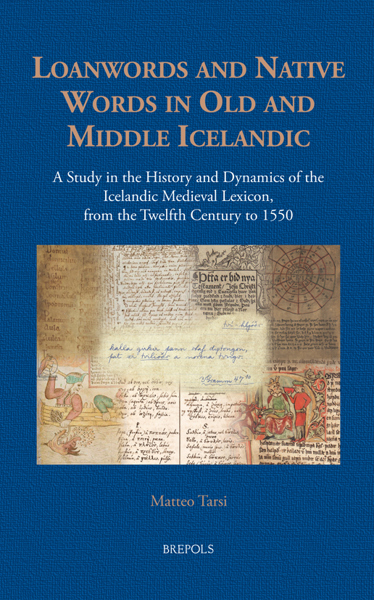Loanwords and native words in Old and Middle Icelandic: A study in the history and dynamics of the Icelandic medieval lexicon, from the twelfth century to 1550
 Anyone familiar with the Modern Icelandic language will know that the country’s policy is to avoid borrowing lexemes from other languages, and instead to draw on their own vocabulary. This often results in the formation of a word pair, consisting of a loanword and its respective native equivalent, as the process of borrowing systematically eludes the tight tangles of language policy. But how did this phenomenon develop in the Middle Ages, before a purist ideology was formed?
Anyone familiar with the Modern Icelandic language will know that the country’s policy is to avoid borrowing lexemes from other languages, and instead to draw on their own vocabulary. This often results in the formation of a word pair, consisting of a loanword and its respective native equivalent, as the process of borrowing systematically eludes the tight tangles of language policy. But how did this phenomenon develop in the Middle Ages, before a purist ideology was formed?
This volume offers a unique analysis of a previously unexplored area of Old Norse linguistics by investigating the way in which loanwords and native synonyms interacted in the Middle Ages. Through a linguistic-philological investigation of texts from all medieval Icelandic prose genres, the book maps out the strategies by which the variation and interplay between loanwords and native words were manifested in medieval Iceland and suggests that it is possible to identify the same dynamics in other languages with a comparable literary tradition. In doing so, new light is shed on language development and usage in the Middle Ages, and the gap between case-study and general linguistic theory is bridged over.
zum Buch im ULB-KatalogPlus
zum Buch auf der Verlags-Website
Das Schicksal der Erde: Katastrophenzukünfte in skandinavischer Science Fiction des Anthropozäns
 Seit 1950 zeichnen sich die Folgen des zunehmenden menschlichen Einflusses auf die Erde immer deutlicher ab und erzwingen eine Konfrontation mit möglichen zukünftigen Katastrophen. Nirgendwo anders wird die Katastrophenzukunft im ›Zeitalter des Menschen‹, dem sog. Anthropozän, so eindrucksvoll imaginiert und erzählt wie in Science Fiction. Das vorliegende Buch untersucht anhand zweier weitsichtiger skandinavischer Erzählungen aus der zweiten Hälfte des 20. Jahrhunderts die Funktion von Science Fiction als Reflexionsmedium für den gegenwärtigen epochalen Wandel. Der Fokus liegt sowohl auf der Bewusstwerdung eines neuen Selbst- und Weltbilds als auch auf den mit der Katastrophenzukunft einhergehenden Herausforderungen für die Repräsentation.
Seit 1950 zeichnen sich die Folgen des zunehmenden menschlichen Einflusses auf die Erde immer deutlicher ab und erzwingen eine Konfrontation mit möglichen zukünftigen Katastrophen. Nirgendwo anders wird die Katastrophenzukunft im ›Zeitalter des Menschen‹, dem sog. Anthropozän, so eindrucksvoll imaginiert und erzählt wie in Science Fiction. Das vorliegende Buch untersucht anhand zweier weitsichtiger skandinavischer Erzählungen aus der zweiten Hälfte des 20. Jahrhunderts die Funktion von Science Fiction als Reflexionsmedium für den gegenwärtigen epochalen Wandel. Der Fokus liegt sowohl auf der Bewusstwerdung eines neuen Selbst- und Weltbilds als auch auf den mit der Katastrophenzukunft einhergehenden Herausforderungen für die Repräsentation.
zum Buch im ULB-KatalogPlus
zum Buch auf der Verlags-Website
Weitere Titel können Sie in unseren Neuerwerbungslisten für die Nordische Philologie entdecken!
